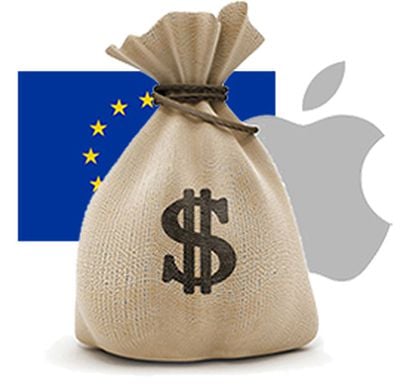 Apple is set to appeal this week against the European Commission's ruling that it must pay up to 13 billion euros ($13.8 billion) to Ireland in back taxes (via Reuters).
Apple is set to appeal this week against the European Commission's ruling that it must pay up to 13 billion euros ($13.8 billion) to Ireland in back taxes (via Reuters).
EU regulators concluded in August that Apple had received undue tax benefits from Ireland – where the company's European headquarters are located – which allowed it to pay substantially less than other companies.
Apple CEO Tim Cook vowed to appeal the ruling at the time, calling the back tax calculation a "false number" and the EU's judgement "total political crap". The Irish government also rejected the conclusion and said it would fight to reverse it.
On Monday, Apple's General Counsel Bruce Sewell told Reuters that the company's imminent legal challenge will be based on its belief that EU regulators willfully ignored tax experts to come to its conclusions.
"The Irish put in an expert opinion from an incredibly well-respected Irish tax lawyer. The Commission not only didn't attack that - didn't argue with it, as far as we know - they probably didn't even read it. Because there is no reference (in the EU decision) whatsoever."
Sewell also said Apple intends to challenge the EU's basis for its penalty judgement, and will argue that a "crazy notion of non-residency" was chosen on purpose to produce a punitive amount, when other legitimate tax law arguments could have been used that would "produce much lower numbers". As to why the EU had gone down its chosen route, Sewell said he believed regulators had singled out the company because of its success.
"Apple is not an outlier in any sense that matters to the law. Apple is a convenient target because it generates lots of headlines. It allows the commissioner to become Dane of the year for 2016," he said, referring to the title accorded by Danish newspaper Berlingske last month.
Ireland also issued a statement on Monday, saying that the EU commission had "misunderstood the relevant facts and Irish law".
"Ireland did not give favourable tax treatment to Apple - the full amount of tax was paid in this case and no state aid was provided," it said. "Ireland does not do deals with taxpayers."
In addition, Apple says it plans to tell the court that the Commission erred when it ruled that Ireland-based Apple Sales International (ASI) and Apple Operations Europe existed only on paper, with no justification for the billions of euros it posted in untaxed profits. Sewell said that just because a holding company has no employees on its books doesn't mean it is inactive, since it could be actively managed by employees of its parent company:
"When Tim Cook, who is the CEO of our company, makes decisions that impact ASI, the Commission says we don't care because he is not an ASI employee, he is an Apple Inc employee. But to say that somehow Tim Cook can't make decisions for ASI is a complete mis-statement of corporate law, it's a misunderstanding of how corporations operate."
The strongly worded statements from Apple and the Irish government form a two-pronged attack on the European Commission as it readies a more detailed version of its ruling for publication before the court case begins.
Note: Due to the political nature of the discussion regarding this topic, the discussion thread is located in our Politics, Religion, Social Issues forum. All forum members and site visitors are welcome to read and follow the thread, but posting is limited to forum members with at least 100 posts.


















